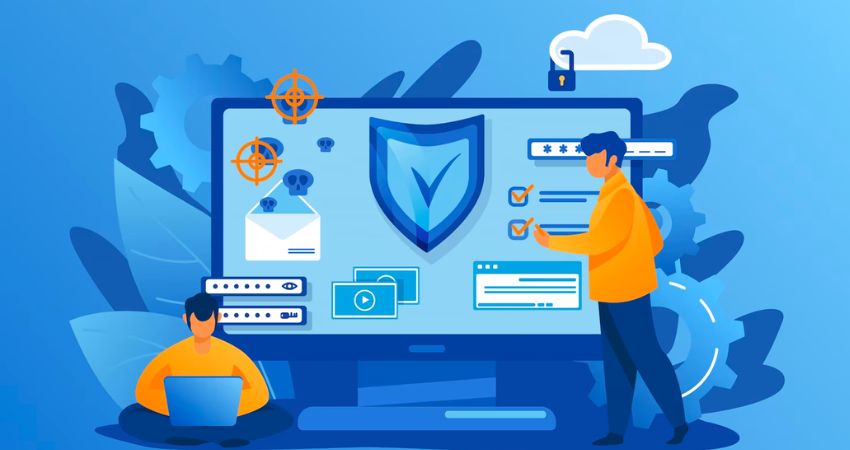Table of Contents
- Introduction
- Understanding Cyber Threats
- Top Cyber Security Tips
- Staying Informed
- FAQs
- What are the basic cyber security tips I should follow to stay safe online?
- How can I protect my personal information and privacy on the internet?
- What should I do if I suspect that my computer or accounts have been hacked or compromised?
- Are there specific recommendations for creating strong and secure passwords?
- What are the latest cyber threats and trends to be aware of in order to stay safe online?
- Conclusion
- Read More Articles
Introduction
In today’s digital landscape, safeguarding your online presence is no longer a choice but a necessity. With the relentless surge in cyber threats, individuals must take proactive measures to protect themselves. This blog aims to equip you with practical cyber security tips to navigate the online world securely.
Understanding Cyber Threats
Types of Cyber Threats
The digital realm is fraught with diverse cyber threats that can compromise your online security. It’s essential to comprehend these threats for better protection:
Malware
Malware, or malicious software, encompasses a range of threats such as viruses, ransomware, and spyware. These digital pests infiltrate your devices, pilfer sensitive data, and unleash chaos.
Phishing Attacks
Phishing attacks are cunning attempts to dupe individuals into disclosing personal information or login credentials via deceptive emails, websites, or messages. Falling prey to these scams can result in identity theft and financial losses.
Social Engineering
Social engineering employs psychological manipulation to deceive individuals into revealing confidential information or carrying out actions against their best interests. These tactics prey on trust and human psychology.
Top Cyber Security Tips
Password Security
Strong Passwords
Creating robust, unique passwords is a fundamental step in fortifying online security. Consider the following guidelines:
- Utilize a blend of uppercase and lowercase letters, numbers, and symbols.
- Steer clear of easily guessable information like birthdays or common words.
- Aim for passwords that are at least 12 characters in length.
- Maintain different passwords for each of your online accounts.
Password Managers
Managing a multitude of complex passwords can be daunting. Password manager tools come to the rescue by:
- Securely storing and autofilling your passwords.
- Generating strong passwords on your behalf.
- Simplifying the task of maintaining password security.
Software and System Updates
Importance of Updates
The significance of keeping your software and operating systems up to date cannot be overstated. Updates frequently patch security vulnerabilities that hackers are eager to exploit.
Enabling Automatic Updates
For those less tech-savvy, enabling automatic updates is a seamless way to stay protected. Most software offers an easy toggle to enable this feature.
Two-Factor Authentication (2FA)
What is 2FA?
Two-factor authentication (2FA) adds an extra layer of security, requiring not only something you know (your password) but also something you have (e.g., your smartphone) to access your accounts.
Enabling 2FA
Setting up 2FA for your online accounts is straightforward:
- Navigate to your account’s security settings.
- Enable 2FA and follow the provided setup instructions.
- Whenever possible, use 2FA to fortify your security.
Safe Browsing Habits
Avoiding Suspicious Websites
Recognizing and avoiding suspicious websites is paramount. Exercise caution with:
- Misspelled domain names or dubious URLs.
- Websites lacking encryption (look for “https://”).
- Be wary of clickbait advertisements and pop-ups.
Secure Wi-Fi Connections
Secure your home Wi-Fi network by:
- Establishing a robust Wi-Fi password.
- Enabling advanced encryption protocols like WPA3 or WPA2.
- Routinely updating your router’s firmware to bolster security.
Email Security
Email Best Practices
Shield yourself from phishing emails by:
- Scrutinizing sender identities for authenticity.
- Refraining from clicking on dubious links.
- Exercising caution with email attachments from unknown sources.
Email Encryption
Consider utilizing email services that offer end-to-end encryption, such as ProtonMail or Tutanota, to keep your communications secure.
Regular Backups
Data Backup Importance
Backing up critical data regularly serves as a safeguard, helping:
- Mitigate the fallout of ransomware attacks.
- Ensure you can recover essential information in the event of data loss.
Backup Methods
Various backup methods exist, including cloud storage, external drives, and network-attached storage (NAS). Implement automated backup schedules to maintain data continuity.
Staying Informed
Cybersecurity Resources
Trusted Sources
Stay informed about cyber security by relying on trustworthy sources such as:
Reputable cybersecurity blogs like KrebsOnSecurity and Schneier on Security.
Organizations committed to online security, including the Electronic Frontier Foundation (EFF) and the Center for Internet
Security (CIS).
- Government agencies like the Federal Trade Commission (FTC) that provide valuable guidance.
- By staying informed, you empower yourself to proactively protect your digital assets from ever-evolving cyber threats.
FAQs
What are the basic cyber security tips I should follow to stay safe online?
How can I protect my personal information and privacy on the internet?
What should I do if I suspect that my computer or accounts have been hacked or compromised?
Are there specific recommendations for creating strong and secure passwords?
What are the latest cyber threats and trends to be aware of in order to stay safe online?
Conclusion
In a world where our digital and physical lives intertwine, cyber security is not merely an option but an imperative. Implementing the cyber security tips outlined in this blog can fortify your online presence, safeguard your data, and grant you peace of mind in the ever-evolving digital landscape. Stay secure online!
Read More Articles
Hacking Explained: A Beginner’s Guide
The Dark Web: A Closer Look
Social Engineering Attacks: Don’t Get Manipulated
Cyber Security at Home: Tips for Remote Workers
Biometrics: The Future of Authentication

